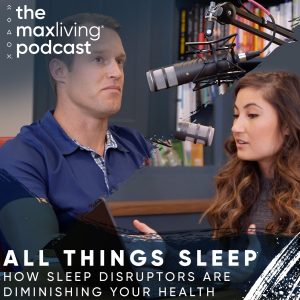
Sleep Disruptors Could be Diminishing Your Health
Did you know that we are the only mammals that intentionally disrupt or delay sleep?
Too often, we “power through” being tired, wake up artificially and put off sleep in favor of “more important” things like work.
Just like with everything else, the disruption of sleep is a symptom, and we want to get to the root cause. This is because if you are not sleeping, you are not functioning at 100%. In other words, you are not healing.
The CDC shows that over 1/3rd of Americans aren’t getting the amount of sleep they need, and we want to change that! We need sleep for everything from mood and productivity to hormone regulation and weight control. According to studies, adults need at least 7 hours of healthy, deep sleep every night.
So, are you sleeping well?
If you are experiencing symptoms like high blood pressure, changes in mood, or decreased immune strength, they could be warning signs that you aren’t sleeping well! You may think you are going to bed and getting up on a consistent 7 or 8 our schedule each night, but that doesn’t necessarily mean you are getting the sleep you need. In other words, it isn’t just the quantity of sleep that matters, it is the quality.
Throughout the night, our bodies are meant to go through about 3 cycles of REM (Rapid Eye Movement) sleep. This cycle allows us to “recharge.” Our brains reset and recharge, our bodies rest and heal, and we prepare to take on the next day at optimal health.
But, if we fail to get that deep, quality sleep, it’s like connecting your phone to a charger and the cord being unplugged. No matter how much you are sleeping, if you aren’t getting deep sleep, it may be interfering with the regeneration and healing processes of the brain and body.
As Dr. Nick and Dr. Traci discuss in this episode, a lack of quality sleep can be a domino effect, causing an unhealthy shift in habits and disrupting essential cycles in your body.
One of these cycles is your body’s natural cortisol levels. Cortisol is a stress hormone that rises and falls in level in order to wake up each day, but it is interrupted when we have too little sleep. This is because our bodies know we should not wake up, and thus do not increase cortisol levels. When we wake up to an alarm clock before our bodies are ready, we are left feeling exhausted and craving that cortisol boost. And where do we find it?
With caffeine!
However, too much caffeine, especially as a replacement for natural cortisol levels, could cause continually elevated cortisol levels. When your cortisol levels are consistently high, you are consistently stressed. Plus, high cortisol levels lead to a craving for sugars and carbs!
Cortisol can be a savior, but only when it naturally occurs at the correct levels that your body needs. Your habits could be negatively affecting this, which then could interrupt your sleep patterns!
In order to keep yourself from feeling these negative effects, there are immediate action steps that you can take to improve your sleep and support your health! Listen in to this episode for the warning signs of sleep disruption and the steps you can take to promote healthy sleep habits.
Check out some related articles about this topic: Need Help With Weight Loss, Better Health, Solid Relationships and More? Get Great Sleep
Subscribe today via Apple Podcasts or your favorite podcast app.